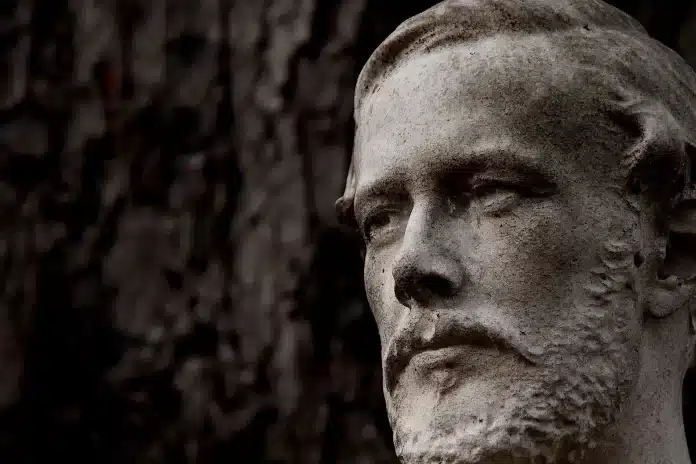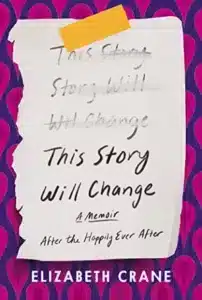Note: The ManifestStation is thrilled to share an excerpt from Diane Josefowicz’s brilliant first novel Ready, Set, Oh. Enjoy!
Tavio Brindisi, the master tailor, was dead. Or close to it. If the spirit was ambivalent, the flesh was altogether resolved, as if the cold metaphorical shoulder that Tavio habitually turned against life had at last become real and gone systemic. Yet the undertaker was sure that whenever he turned his back, Tavio was up to his tricks, jerking his thumb, scratching his nose, or twitching his wrist inside his shirt cuff, just enough to dislodge the link.
That was Tavio, a certified hyperactive Ants-In-His-Pants. Not even rigor mortis was going to change that.
Everyone knew the story of how, eight decades back, on a jetty nosing into the green sea, Tavio had embraced his mother, whom he was unlikely to see again this side of heaven. How, at the last moment, he had pulled back, patted her shoulder, and said: Eh, basta. Ebbasta. Enough.
In any other family, it might have been dismissed, or minimized, or forgotten—just another one of those mysteries that charge the world like soap on a brush, lifting the day’s stubble, the better to scrape it away. It was not such a mystery, though, if you knew the Brindisis. A hair-raising family, with minds like quicksilver and feelings to match.
On the quay, Tavio’s mother had stepped back, fixing her son with the trademark Brindisi dick-shriveling look. And into his pockets, quick as rabbits, went those fidgety hands—the same ones that now refused to stay folded, one over the other, even as the undertaker silently threatened him with the moose glue and the stapler.
Dom Carcieri wiped his face, surprised to find it filmed with sweat.
There was another story about Tavio: When the immigration officer in the Port of ProvidTavio was never one to make things easy. Stitching Tavio’s mouth shut, it occurred to him that to do so was a pleasure not granted to many in this life.ence asked for his place of birth, Tavio replied, Baccauso Natale, which meant, in rougher words, Original Shithole. This response was recorded, even though Tavio had named not so much a place as a state of mind. Di dove? Where you from? The question was the refrain of his days. And so Tavio would dig his papers from his wallet and point to the relevant line, proof that he did hail from a Shithole, all the while gesturing at some forgettable geography over his shoulder.
The undertaker spun the lid off the container of pancake makeup and smoothed a palmful over Tavio’s face. The effect was mildly Floridian.
It was his father, he recalled, who had sponsored Tavio’s passage. The ticket was a favor, the sort of thing people did back then. Being the beneficiary of such generosity didn’t stop Tavio from running his mouth, of course, griping to anyone with an open earhole about his steerage ticket. Still, Tavio had more than repaid the Carcieri family over the years. Not so much in money—Dom Senior was happy to embalm everyone in town, but he refused, on principle, to be anyone’s padrone—but in tailored trousers, waistcoats and cummerbunds, double-breasted, three-piece, you-name-it, so that the two families had been literally in each other’s exquisitely stitched pockets for decades, at holidays, weddings, and perhaps especially, given the Carcieri family business, at funerals, when Tavio made sure to get everyone’s sartorial details, not least the corpse’s, exactly right. The hand, the drape, the pleat, the hem—these details mattered so much to Tavio that, even after the advent of the electric sewing machine, he insisted on hand-stitching the jobs that still came his way, each stitch no bigger than a tsetse fly. What a pain in the culo you are, Dom Carcieri muttered into Tavio’s ear and, feeling a tickle, snipped away a single coarse hair. He wove Tavio’s fingers together and set them with a dab of glue. He nudged the elbow; the hands stayed where they were. Piano, piano—he draped a rosary over them and resisted the temptation to further buff the fingernails. Best not to push. Tavio was stubborn, and he got attached to things. Fidgeting, for instance. Or a good suit.
Tavio, who would have been a hundred come July, was dressed in a gray morning suit cut in the no-nonsense style popular during the Eisenhower administration. He’d made the suit twelve years before, in ’55, right after he’d learned that the pains in his head were due to something more sinister than the eyestrain that might be expected from a lifetime spent hunched over a needle and thread while trying, at the same time, to raise three daughters, all of whom seemed bent on murdering him with their agita-producing behavior. Not to put too fine a point on it—Dom Carcieri flicked a bit of lint from Tavio’s shoulder—those Brindisi girls were agita-machines, as evinced by all the chest-tightening stories that made their way around the neighborhood: the burnt Sunday gravies, the kitchen fires and laundry-room floods, not to mention the assorted abrasions, bangs, burns, blisters, concussions, contusions, and, above all, the operatic heartbreaks that always seemed to happen when one of the girls did not get her own way in some matter, usually romantic. Hoping his daughters would be good, plain American girls, Tavio had given them good, plain American names—Mary, June, and, daring to be a little fancier with his youngest, Lorraine. All for nothing, or nearly so: for they were neither good, nor plain, though they were certainly American in their love of home appliances, their excitement over mark-downs at Shepard’s, and their expressive driving—about which, Dom reflected, crossing himself, the less said, the better. Tavio had been especially undone by their antics after his wife, Emmie, had died of heart failure while hanging sheets in the backyard on the same day that the radio carried the news of Lou Gehrig’s retirement. Without Emmie, the girls were Tavio’s alone to manage, and they were a handful. More than.
Dom Carcieri rubbed his eyes. What had he forgotten?
Never mind. Watch the hands.
Yes: They had not moved, not even when the glue had rolled down one knuckle, a detail gone awry that Tavio, in better days, would not have been able to resist correcting for an instant. Dom Carcieri wiped the glue away, noting not just the folded hands but also the ruby glass rosary spilling from them, the gold wedding band, the makeup that lightened, but did not quite conceal, the liver spot at the base of one thumb. Satisfied, he closed the lid with a smack, which he immediately regretted. It was never good to be a sore winner, even if the old mule had asked for it, putting up a fight even as the earth was being prepared to receive him. On his way out, after he’d locked the door, Dom Carcieri had a crazy feeling: What if, while he was gone, Tavio got up and improved something?
He shook his head. No point getting worked up. There weren’t too many of these guys left, men of his father’s generation. On the one hand, you hated to see them go. On the other, well, it was just as his father always said. Nature’s way.
The old man’s five years gone, he thought, and still I ’m hearing his voice in my ear. As if his father still held the keys to life and death, the way he’d held the keys to the car, and the liquor cabinet, and the funeral parlor’s back room. But the only thing his father was holding now was a handful of dirt in the Pocasset cemetery, his wedding ring resting loose around the bone. The tombstone gave the basics: b. 1870, Pietravairano, d. 1962, Providence.
A world was disappearing with these guys—the old places, the old ways.
The undertaker rattled the door again and made for home, where he heated a cup of milk and drank it at the kitchen sink. When the grandfather clock chimed midnight, he padded upstairs and slipped into bed beside his wife, her sleeping face slack as any corpse’s, her nightgown hiked and twisted. At five, he opened his eyes to a nightingale singing. He reached under the blankets to touch his chest, as if that damned nightingale were trapped inside. But of course, it was only his own heart. It slowed; he breathed easier. His wife murmured in her sleep.
Dom Carcieri heaved himself upright.
The hat. Goddamn it. He’d gone and forgotten Tavio Brindisi’s goddamn top hat.
 Diane Josefowicz’s fiction and essays have appeared in Conjunctions, Fence, Dame, LA Review of Books, and elsewhere. As a historian, she is the author, with Jed Z. Buchwald, of two histories of Egyptology, The Riddle of the Rosetta (2020) and The Zodiac of Paris (2010), both from Princeton University Press; and a novella, L’Air du Temps (1985), forthcoming from Regal House. She serves as reviews editor at Necessary Fiction and director of communications for Swing Left Rhode Island, a progressive political organization focused on electoral work, voter protection, and voting rights. She holds an MFA from Columbia University, a PhD from the Massachusetts Institute of Technology, and a BA from Brown University. She grew up outside Providence, where she now lives with her family. Ready, Set, Oh is her first novel.
Diane Josefowicz’s fiction and essays have appeared in Conjunctions, Fence, Dame, LA Review of Books, and elsewhere. As a historian, she is the author, with Jed Z. Buchwald, of two histories of Egyptology, The Riddle of the Rosetta (2020) and The Zodiac of Paris (2010), both from Princeton University Press; and a novella, L’Air du Temps (1985), forthcoming from Regal House. She serves as reviews editor at Necessary Fiction and director of communications for Swing Left Rhode Island, a progressive political organization focused on electoral work, voter protection, and voting rights. She holds an MFA from Columbia University, a PhD from the Massachusetts Institute of Technology, and a BA from Brown University. She grew up outside Providence, where she now lives with her family. Ready, Set, Oh is her first novel.
***
Wondering what to read next?
This is not your typical divorce memoir.
Elizabeth Crane’s marriage is ending after fifteen years. While the marriage wasn’t perfect, her husband’s announcement that it is over leaves her reeling, and this gem of a book is the result. Written with fierce grace, her book tells the story of the marriage, the beginning and the end, and gives the reader a glimpse into what comes next for Crane.
“Reading about another person’s pain should not be this enjoyable, but Crane’s writing, full of wit and charm, makes it so.”
—Kirkus (starred review)
***

